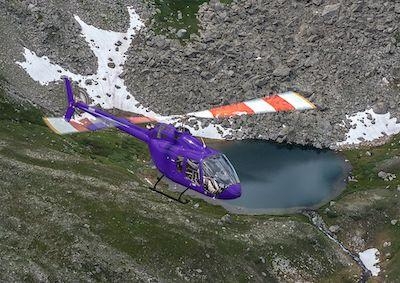Tue, Dec 03, 2019
Outlines Requirements For Crash-Resistant Fuel Systems, Seats And Other Structures
The FAA has published a tool kit for helicopter operators outlining requirements for crash-resistant systems and structures that go into effect in April, 2020.

The agency says that helicopters equipped with crash resistant fuel systems, crash resistant seats and structures provide the highest level of protection for pilots and passengers. A crash resistant fuel system increases the likelihood of surviving a helicopter crash due to a reduced threat of injuries from fire. Crash resistant seats and structures increase the probability of surviving the initial collision from an accident.
In the FAA Reauthorization Act of 2018, Section 317 prohibits helicopters manufactured after April 5, 2020, from flying in U.S. airspace unless certified with a crash resistant fuel system.
Crash resistant fuel systems increase safety for occupants by decreasing or delaying a post-crash fire. Systems that meet the FAA’s regulatory requirement minimize fuel leaks and lessen fuel ignition sources. Crash resistant fuel systems are required for all helicopter models that were certified after 1994. However, the requirement did not apply to newly built helicopters if the original design was certified before 1994. Most newly built helicopters continued to be those certified before 1994. As a result, nearly 25 years later, a low percentage of U.S. helicopters (about 15 percent) meet the regulatory requirement.
Similar to fuel systems, the design requirements for crash resistant seats and structures also improve survivability of a crash. They absorb a greater amount of the crash energy and they can prevent an occupant’s head from hitting the interior of the helicopter.
Due to the FAA regulatory requirement, all helicopter models certified after 1989 must have crash resistant seats and structures. However, if the original design was certified before 1989, the regulatory requirement does not apply. As a result, 30 years later, a low percentage of U.S. helicopters (about 10 percent) meet the regulatory requirement.
(Source: FAA. Image from file)
More News
Airport Rotating Beacon A visual NAVAID operated at many airports. At civil airports, alternating white and green flashes indicate the location of the airport. At military airports>[...]
Aero Linx: Fly for the Culture Fly For the Culture, Inc. is a 501(c)(3) non-profit organization that serves young people interested in pursuing professions in the aviation industry>[...]
Klyde Is Having Some Issues Comprehending The Fed's Priorities FMI: www.klydemorris.com>[...]
Also: Viasat-uAvionix, UL94 Fuel Investigation, AF Materiel Command, NTSB Safety Alert Norges Luftsportforbund chose Aura Aero's little 2-seater in electric trim for their next gli>[...]
Also: EP Systems' Battery, Boeing SAF, Repeat TBM 960 Order, Japan Coast Guard H225 Buy Despite nearly 100 complaints totaling millions of dollars of potential fraud, combined with>[...]
 ANN's Daily Aero-Term (04.25.24): Airport Rotating Beacon
ANN's Daily Aero-Term (04.25.24): Airport Rotating Beacon ANN's Daily Aero-Linx (04.25.24)
ANN's Daily Aero-Linx (04.25.24) Klyde Morris (04.22.24)
Klyde Morris (04.22.24) Airborne 04.24.24: INTEGRAL E, Elixir USA, M700 RVSM
Airborne 04.24.24: INTEGRAL E, Elixir USA, M700 RVSM Airborne 04.22.24: Rotor X Worsens, Airport Fees 4 FNB?, USMC Drone Pilot
Airborne 04.22.24: Rotor X Worsens, Airport Fees 4 FNB?, USMC Drone Pilot



